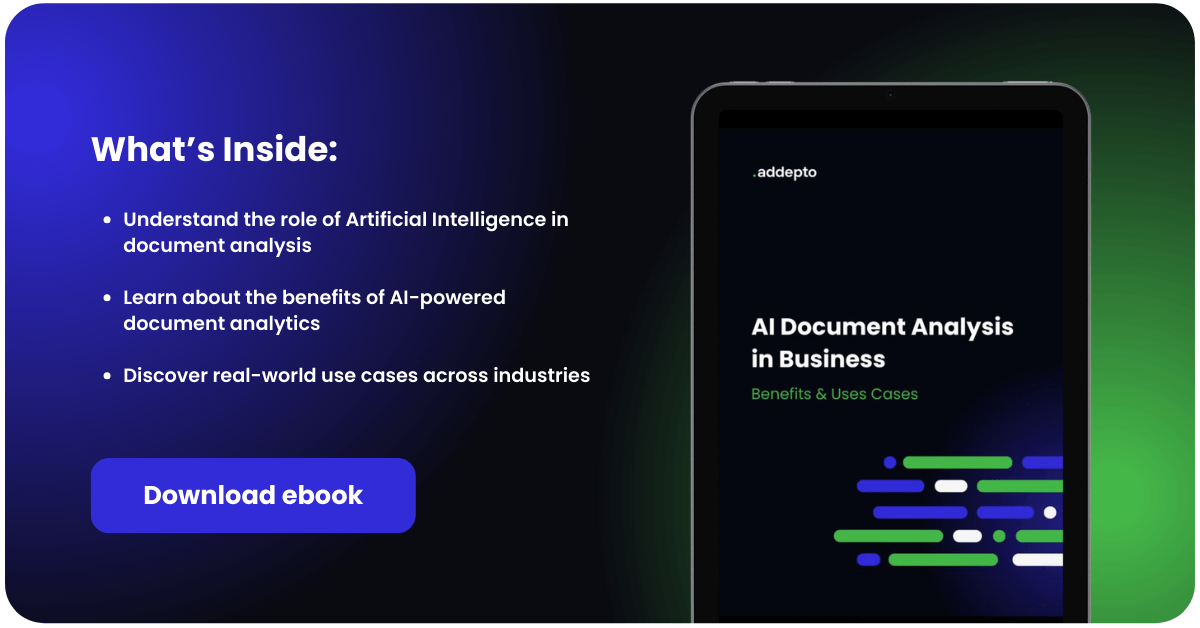
May 07, 2024
Domain-Specific Generative AI: Top 5 Examples of How to Use It for Your Business
Author:

CSO & Co-Founder
Reading time:
7 minutes
The generative AI global market is projected to reach an outstanding $110.8 market value by 2030. [1] This projection comes as no surprise considering the technology’s potential to revolutionize business processes throughout the supply line.
Unfortunately, general generative AI has numerous limitations, particularly in addressing challenges unique to specific business applications. In order to address these limitations, businesses have to fine-tune generative AI models on domain-specific data for better accuracy and reliability.
This article will explore domain-specific generative AI models, right from what they are to the various use cases in business.
Addepto has developed a ContextClue – an AI Text Analysis Tool that can advance your business’s document analysis!
What is domain-specific generative AI?
Generative AI is a branch of Artificial Intelligence (AI) that focuses on developing and training models that can create new, original content based on their training data. These models typically work by learning the underlying patterns in the training data and using that knowledge to generate new data points.
These models have a dual-component working system consisting of a generator and a discriminator. The generator applies user prompts to produce data samples resembling the training data while the discriminator assesses the authenticity and accuracy of the samples.
This creates a sort of competition whereby the generator tries to deceive the discriminator while the discriminator tries to distinguish the created samples from real data. This interactive training process eventually makes the generator more effective at generating realistic outputs.
Domain-specific generative AI, on the other hand, takes a more specialized approach to data creation. Unlike general AI, which is trained on large, varying data sets, domain-specific generative AI models are trained on data sets specific to a particular domain, thus making them more accurate and reliable in their respective domains.

It might be interesting for you: Generative AI removes limitations of traditional rule-based automation

How to use domain-specific generative AI for your business?
You can use bespoke solutions or create domain-specific generative AI models suitable for various applications by fine-tuning general AI.
Here are a few ways to use domain-specific generative AI in different industries.
E-commerce
One of the most notable use cases of domain-specific generative AI in e-commerce is chatbots. Chatbots provide personalized experiences by responding to customer queries and providing useful information about the business’s products and services. They also limit the need for an extensive customer support department, thus cutting your operational costs.

For instance, Erica, a chatbot developed by the Bank of America, assists customers with basic banking tasks and even offers sound financial advice. The chatbot uses Machine learning (ML) and Natural Language Processing (NLP) to understand customers and provide meaningful responses based on customers’ prompts. [2]
Generative AI can also improve personalization in the e-commerce space by providing recommendations based on a customer’s interests and previous purchases. Take Amazon’s recommendation engine, for instance.
The engine provides personalized product suggestions and targeted ads based on user data. This way, the model is better able to provide a personalized shopping experience that leads to better customer satisfaction, increased purchase rates, and higher conversion rates. [3]
Healthcare
Domain-specific generative AI can be a game changer in the healthcare sector. By leveraging generative AI, businesses in the healthcare sector can mitigate some of the bottlenecks involved in service delivery, especially when it comes to patient data. As people grow weary of how their personal data is used, they’re less likely to disclose it. This makes it hard for researchers to get the data they need to perform medical studies.

However, with generative AI models like Synthea, short for Simulated Electronic Medical Record, researchers can generate synthetic patient data for research and studies. [4]
Similarly, generative AI models like NVIDIA’s AI-driven research project can generate synthetic medical images for training medical personnel or as training data for other models that help with improving the accuracy of medical diagnoses. [5]
Manufacturing and Supply Chain
Generative AI use cases in business don’t just end at chatbots and personalization. It can also facilitate product development and design. Take Autodesk’s generative design technology [6], for instance.
The model can explore and generate optimized design solutions based on the project’s objectives and specified constraints. It can create innovative designs for various manufacturing applications, including architectural designs, automotive components, and aerospace parts. [7]

With customer demands and purchase trends changing every other day, manufacturing companies have a hard time coming up with accurate demand forecasts. Generative AI models like IBM’s Watson Supply Chain [8] effectively analyze historical sales data, market trends, and other external factors to accurately predict demand patterns. [9]
Eventually, this can help businesses optimize their inventory management, improve their production planning, and remove inefficiencies in their supply chain.
Generative AI can also help with quality control and defect detection in manufacturing processes. Take ABB’s generative AI solutions, for instance. The model uses computer vision and deep learning technologies to identify defects and anomalies in manufactured products. By automatically identifying and classifying defects, this model can help companies improve their manufacturing processes and product quality.
Education
The advent of generative AI models like ChatGPT has completely revolutionized the education sector, right from the teaching and learning process to the creation of educational materials.
Personalized learning models like Knewton’s adaptive learning [10] platform can effectively analyze a student’s performance data and generate a personalized learning path. By evaluating a student’s strengths, weaknesses, and preferred learning styles, the model can develop a curriculum that enhances the student’s engagement, thus boosting the learning outcome.

Similarly, language learning platforms like Duolingo can provide personalized learning experiences by generating exercises and interactive learning sessions tailored to individual learners.
Entertainment
The entertainment industry is always in a constant search for new, engaging content. With domain-specific generative AI models, industry players can generate diverse content at a much higher rate compared to traditional content-creation methods.
For instance, Jukedeck can generate original musical compositions tailored to specific moods, themes, and genres. [11] It also allows users to create custom music for various applications, including video games, films, and advertisements.
Similarly, generative AI tools like Magisto, VEED, Adobe Premiere Pro can help video editors and producers automate video editing processes like trimming and adding transitions and visual effects. [12] [13] Ultimately, this makes for a faster post-production process.
Final thoughts on domain-specific generative AI
Generative AI models are already changing the way we do business by streamlining various processes. Domain-specific generative AI models can take this even further by addressing the unique challenges faced by different industries and providing bespoke solutions. Ultimately, this will lead to greater ROI for businesses, improved service delivery, and more streamlined supply chain and production processes.
Domain-specific AI – FAQ
What is generative AI?
Generative AI is a branch of Artificial Intelligence (AI) focused on developing models capable of creating new, original content based on their training data. These models learn underlying patterns in data to generate new data points.
What are the components of generative AI models?
Generative AI models typically consist of a generator and a discriminator. The generator produces data samples resembling the training data based on user prompts, while the discriminator evaluates the authenticity and accuracy of these samples.
What is domain-specific generative AI?
Domain-specific generative AI takes a specialized approach to data creation by training models on specific data sets related to particular domains. This results in more accurate and reliable outputs tailored to the needs of specific industries or applications.
How can domain-specific generative AI be used in business?
Domain-specific generative AI has various applications across industries:
- E-commerce: Enhancing customer experiences through personalized chatbots and product recommendations.
- Healthcare: Generating synthetic patient data for research and medical image synthesis for training.
- Manufacturing and Supply Chain: Optimizing product design, demand forecasting, inventory management, and quality control.
- Education: Personalizing learning experiences and creating educational materials.
- Entertainment: Generating diverse content such as music compositions and aiding in video editing processes.
What are the benefits of domain-specific generative AI?
By addressing specific business challenges and providing bespoke solutions, domain-specific generative AI can lead to greater return on investment, improved service delivery, and more streamlined processes across industries.
This article is an updated version of the publication from Jun 15, 2023.
Category:






